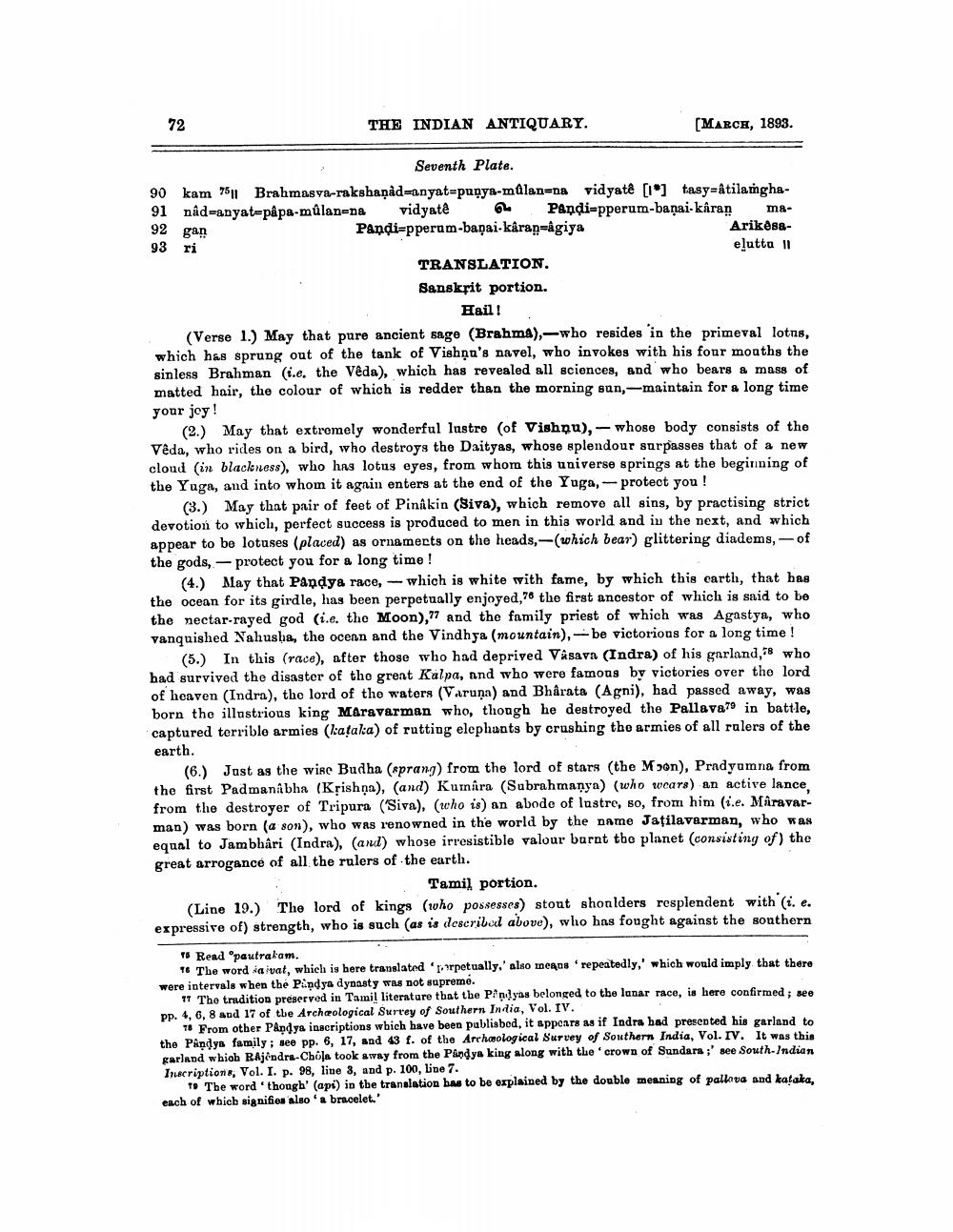________________
72
THE INDIAN ANTIQUARY.
Seventh Plate.
90 kam 75 Brahmasva-rakshanad-anyat-punya-mulan na vidyatê [1] tasy=âtilamgha91 nâd-anyat=pâpa-mûlan-na vidyate
Pandi-pperum-bagai-karap
92 gan
93 ri
The
Pandi-pperum-bapai-karan-âgiya
TRANSLATION.
Sanskrit portion.
[MARCH, 1893.
Hail!
-
ma
Arikêsaelutta II
(Verse 1) May that pure ancient sage (Brahma),-who resides in the primeval lotns, which has sprung out of the tank of Vishnu's navel, who invokes with his four mouths the sinless Brahman (i.e. the Vêda), which has revealed all sciences, and who bears a mass of matted hair, the colour of which is redder than the morning sun,-maintain for a long time your joy!
(2.) May that extremely wonderful lustre (of Vishnu), whose body consists of the Vêda, who rides on a bird, who destroys the Daityas, whose splendour surpasses that of a new cloud (in blackness), who has lotus eyes, from whom this universe springs at the beginning of the Yuga, and into whom it again enters at the end of the Yuga, - protect you!
(3.) May that pair of feet of Pinâkin (Siva), which remove all sins, by practising strict devotion to which, perfect success is produced to men in this world and in the next, and which appear to be lotuses (placed) as ornaments on the heads,-(which bear) glittering diadems, - of the gods, protect you for a long time!
(4.) May that Pandya race, which is white with fame, by which this earth, that has the ocean for its girdle, has been perpetually enjoyed,76 the first ancestor of which is said to be the nectar-rayed god (i.e. the Moon)," and the family priest of which was Agastya, who vanquished Nahusha, the ocean and the Vindhya (mountain),-be victorious for a long time!
(5.) In this (race), after those who had deprived Vasava (Indra) of his garland, who had survived the disaster of the great Kalpa, and who were famous by victories over the lord of heaven (Indra), the lord of the waters (Varuna) and Bharata (Agni), had passed away, was born the illustrious king Maravarman who, though he destroyed the Pallava in battle, captured terrible armies (kataka) of rutting elephants by crushing the armies of all rulers of the earth.
(6.) Just as the wise Budha (sprang) from the lord of stars (the Moon), Pradyumna from the first Padmanabha (Krishna), (and) Kumara (Subrahmanya) (who wears) an active lance, from the destroyer of Tripura (Siva), (who is) an abode of lustre, so, from him (i.e. Mâravarman) was born (a son), who was renowned in the world by the name Jatilavarman, who was equal to Jambhâri (Indra), (and) whose irresistible valour burnt the planet (consisting of) the great arrogance of all the rulers of the earth.
Tamil portion.
(Line 19.) The lord of kings (who possesses) stout shoulders resplendent with (i. e. expressive of) strength, who is such (as is described above), who has fought against the southern
To Read pautrakam.
16 The word saivat, which is here translated perpetually,' also means 'repeatedly,' which would imply that there were intervals when the Pandya dynasty was not supreme.
77 The tradition preserved in Tamil literature that the Pandyas belonged to the lunar race, is here confirmed; see pp. 4, 6, 8 and 17 of the Archeological Survey of Southern India, Vol. IV.
78 From other Pandya inscriptions which have been publisbed, it appears as if Indra had presented his garland to the Pandya family; see pp. 6, 17, and 43 f. of the Archaeological Survey of Southern India, Vol. IV. It was this garland which Rajendra-Chola took away from the Pandya king along with the crown of Sundara;' see South-Indian Inscriptions, Vol. I. p. 98, line 3, and p. 100, line 7.
*
To The word though' (api) in the translation has to be explained by the double meaning of pallova and kataka, each of which signifies also ' a bracelet.'




